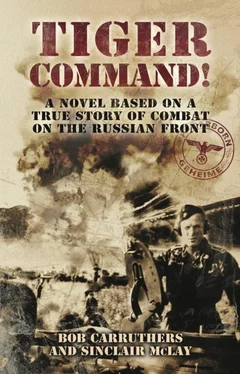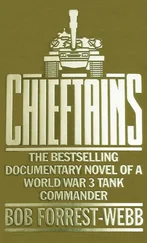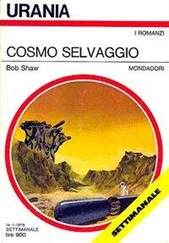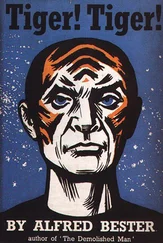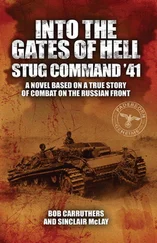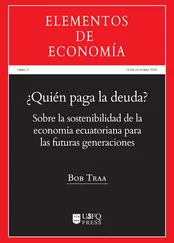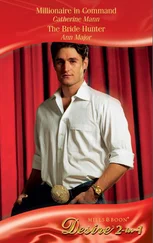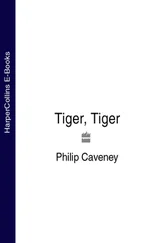“SS-Scharführer Brommann would have thanked you both for it. He was a great friend of mine. Boy, could he drink beer,” said Knispel, warming to his subject.
“Yes, I know. He was at KAMA with me. He was a good man, but he was suddenly sent home… some incident I never quite got to the bottom of. He didn’t speak much. He certainly didn’t deserve to die like that. It’s not over, it’s unfinished business.”
“I bet he didn’t go quietly,” said Knispel, “not old Brommann.”
“So this Laborious, how did he die?” asked Bobby Junge, turning the subject away from the horror of what had happened to the tank recovery team outside Rostov.
“In the arms of his best friend,” replied Karl Wendorff, his voice trailing off as the powerful image evoked by his answer struck him.
All went quiet. Von Schroif gazed out of the train window at the beautifully tended countryside of North Rhine-Westphalia, a view that gave no hint of the carnage that was enveloping the entire world, but a view that reinforced his deeply held conviction that this Germany, this land, these people, were worth upholding. Yes, even to the death, but, for now at least, he had no intention of dying, nor did any of his crew, and that was why they were headed to Paderborn. It was there at the Panzer training grounds that they would get to know their new machine, its likes and dislikes, its temper and its power. Once known, they could then ride into battle with a confidence probably never even dreamed of by any warrior in any age, but it wasn’t going to be an easy introduction.
After arriving at Paderborn, the crew headed straight to their quarters and snatched at what little sleep they could.
*
Dimitri Korsak was in a dilemma. He sat poised over the typewriter, but no words came. All around him were the intrusive sounds of frantic repairs as the few survivors of the second battle for Hill 15 were made ready for a return to the field. The clash of metal and shouts of the battalion workshop intruded on his thoughts and made it impossible to concentrate. Even with this handful of survivors, the unpalatable fact remained that he had lost forty tanks in the second debacle around Hill 15, and his reputation as the best tank commander on the Eastern Front was now sure to come under scrutiny.
Captain Androv, however, was now an evangelist, telling everyone who would listen about their adventures with the anti-tank rifle, but this wasn’t a game of cowboys and Indians, that was small-scale stuff. Korsak now needed a big and unambiguous victory. His special standing in Moscow was now under threat.
He desperately cast around for a positive angle to add to his story. Eventually, the mixture of half-truth and lies emerged. He had thwarted a major German attack and he could just about spin the story around that, but why had his own attack failed? The 88 mm, of course. It was a deadly tank killer. “Thank God the fascists can’t mount that in their tanks!”
Korsak began to type:
“The fascist forces, reputed to be a force of over 150 tanks, supported by a preparatory artillery barrage of army-level intensity, attempted to break through in the Mendov Hill Sector. I managed to bring together a force of 50 T-34 tanks and threw the machines into battle in order to thwart the attack, which led to heavy losses. I personally led the flanking attack which halted the fascist tanks and caused them to withdraw into their smoke barrage.
The fascist advance was completely halted by the courage and sacrifice of the tanks under my command. Further losses were incurred before the fascists were forced to withdraw, leaving us the victors. I was able to gather my machines. All losses were caused not by fire from the fascist tanks, but from 88 mm anti-aircraft guns, whose deployment had been concealed by the smoke barrage.
Initially, it was thought that our losses were caused by a new type of armour-piercing projectile. However, there is now a real danger that the 88 mm will be mounted in a new generation of tank, the possession of which would pose enormous difficulties on the battlefield. The disappearance from the battlefield of von Schroif and his crew needs to be investigated and reported upon by Viper.”
*
“Good morning, gentlemen,” boomed the voice, snapping awake the recently-risen crew. “Your steed has arrived! Now, let’s get started! I am Major Jurgen Rondorf.”
“Pleased to make your acquaintance, Herr Major,” offered von Schroif.
“And yours, but there is no time for pleasantries here. There is a war to be won, and they tell me that you are just the men to do it… Well, we shall see about that.”
With that, he turned and led them out to the courtyard, and there she stood, almost blocking out the early morning April sun.
“Gentlemen, soon to be at your fingertips… Sixty tons of steel, which can deliver 700 horsepower, giving a speed of twenty-five kilometres per hour on tarmac, and fifteen on rough terrain. All above ground, of course, because, as you will soon find out, she can also swim… Now, I know you would love to jump in the saddle and head east, but first, I’m afraid, the boring routine… You have to read this first, then read it again and again and again, as if your lives depended on it, which I assure you my good fellows, they certainly will.”
At that, he lifted up a bundle of the newly printed paper, three centimetres thick, and handed each crewman a copy in turn.
“Much to digest, gentlemen. Here are the details of how to maintain, and fight with, the Panzer Mark VI… or, as I believe we soldiers must now call it, the Tiger. The preliminary written examination will be in four hours’ time. If you are all as good as you are reputed to be, you should all pass with 80%… Physical conditioning for four hours after that. Same again tomorrow, and the day after.”
“Permission to speak, Herr Major?” asked Wohl.
“Granted… if it’s quick.”
“When do we do some driving?”
“Unfortunately, you are not going to get your hands on 250,000 worth of hard earned Reichmarks until your brain knows every nut and bolt of this beauty… and then the hard work begins… Heil Hitler!”
“What are we going to call her though, boys?” muttered Otto as they turned and made their way back to the barracks. “I was fond of Magda, but I think I may have found someone else… Maria? No, maybe something a little more kittenish… Looking up, he realised that no one was responding. They had all set off at a clip back to the barracks, each clutching the pile of papers close, like a new-born child.
“Ach, I suppose they all have difficult new routines to learn,” thought Otto to himself. “My section will be about a page long. I’m just going down to the river◦– not much you can teach me about lifting and loading!”
How wrong he was to be…
Settling himself with his back to a tree, Wohl placed his papers by his side. With less than three hours to the first paper, Wohl would have been well advised to start studying, but his hand was drawn once more towards the breast pocket of his overalls, where nestled the well-thumbed copy of Die Wundertüte, which Wohl had picked up from the news stand for 50 Reichspfennigs. The small illustrated magazine described itself on its garishly illustrated cover as “100 pages of humour and puzzles in words and pictures for the Front and Homeland.” The little magazine was purpose-designed for military personnel and was made to fit in the pocket of a soldier’s battle dress.
Wohl was particularly interested in the illustrations; he decided to save the articles by Hermann Krauze for another day. The racy illustrated pictures of beautiful damsels in a state of undress brought to his mind the work of Peter Jensen, his old art teacher from Munich. They hadn’t seen each other for years, but his encouragement still worked its hold and Wohl dreamed of being a graphic artist. His inspiration was the female form.
Читать дальше
